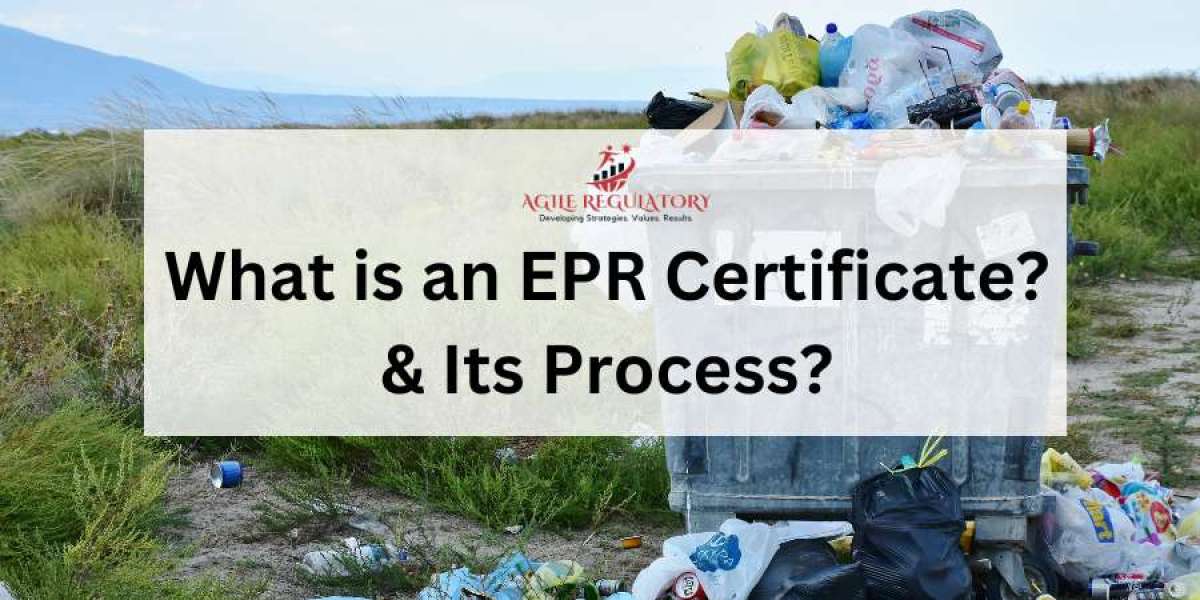Introduction of EPR:
EPR Certification in India is like a thumbs-up for businesses. It means they're responsible not only for making products but also for handling them properly after use. So, if a business has this EPR Certificate, it presents they care about the environment and natural eco-system. They're making sure their products are recycled or disposed of in a way that's good thing for nature. It's basically a way for businesses to prove company is environment friendly.
Process of EPR Certification:
When you are going to apply for EPR certification, it means you're taking responsibility for managing the waste created by your products and its recycling process for the nature's betterment. This can include things like electronic devices, packaging materials, batteries, and sometimes even products from the automotive industry. The exact items depend on the rules set by the authorities. So, if you get EPR certification, you're committing to handling the waste from your products in an environmentally friendly way.
There are several factors you may need to understand in the EPR certification process. These some points are here to consider:
1. Regulatory Compliance: Make sure you understand and dealing with the specific regulations and guidelines set by the relevant environmental authorities in your region. These regulations may be detailed the types of products covered, recycling targets, reporting requirements, and more.
2. Waste Collection Systems: You may need to establish or participate in effective waste collection systems. This involves setting up or collaborating with collection points for consumers to return used products for proper disposal or recycling.
3. Documentation and Reporting: Keep thorough records of your waste management activities. This includes documenting the quantities of products placed on the market, amounts collected for recycling, and other relevant data. Regular reporting to authorities may be required.
4. Collaboration with Stakeholders: Work with various stakeholders, including government agencies, waste management facilities, and possibly other businesses. Building partnerships and collaborations can enhance the effectiveness of your EPR efforts.
5. Awareness and Education: Implement programs to create awareness among consumers about responsible disposal practices. Educate them on how to return products for recycling or safe disposal.
6. Continuous Improvement: EPR is an ongoing commitment. Regularly review and assess your waste management processes, looking for opportunities to improve efficiency and environmental effect.
7. Legal Considerations: Be aware of any legal implications related to non-compliance with EPR regulations. Familiarize yourself with potential penalties or consequences for failing to meet the stipulated requirements.
8. Product Design: Consider designing products with recycling in mind. Products that are easier to disassemble and recycle may contribute to more effective EPR outcomes.
Always stay informed about new updates to rules and regulations or guidelines, as EPR requirements may evolve over time. It's advisable to seek professional advice or consult with relevant authorities who can give you better advices to ensure accurate and up-to-date information for your specific circumstances.
Documents for EPR certificate registration:
While applying for an EPR certificate, you'll need to gather some important paperwork. Here's a simpler breakdown:
1. Business Papers: Bring documents that prove your business is legally registered.
2. Product Info: Share details about the products you make. This includes what they're made of and how many you produce.
3. Waste Plan: Have a clear plan on how you'll handle the waste from your products. This includes how you'll collect, recycle, or dispose of it.
4. Following the Rules: Show how your business follows the specific rules for EPR. This might involve meeting recycling goals and other requirements.
5. Money Matters: Some places may ask for financial statements or proof that your business can handle the costs of waste management.
6. Record-Keeping: Explain how you'll keep track of how many products you sell, how much waste is collected for recycling, and other important details.
7. Talking to Customers: If you talk to customers about responsible waste disposal, share details about these programs.
8. Working with Others: If you're teaming up with other organizations or waste facilities, include any agreements you have with them.
9. Environmental Check (if needed): In some cases, you might need to assess how your products and waste management affect the environment.
Remember, the specific documents can vary, so it's a good idea to check the rules in your area and maybe get some advice from experts or legal professionals.
Eligible Products for EPR Certification:
EPR certification is for products that have a special responsibility when it comes to waste. Here are some types of products that might be included:
1. Electronic Stuff: Like computers, phones, and household gadgets.
2. Packaging Materials: This includes things like plastic, paper, glass, and metal packaging.
3. Batteries: products with batteries, such as toys and electronic devices.
4. Old Vehicles: Some programs involve responsibility for properly getting rid of old cars and trucks.
5. Clothes: In some places, there might be rules for dealing with old clothes.
6. Medicine: Sometimes, there are rules for how to handle and dispose of unused medications.
7. Plastic Things: Certain plastic products, especially those causing environmental concerns, may be included.
Remember, the specific rules can differ depending on where you are. It's a good idea to check the guidelines in your area or location-wise rules and regulations to know exactly which products are covered.
Conclusion:
An EPR certificate is like a gold star for businesses that take extra care of their products. It means they not only make things but also make sure their products are disposed of or recycled properly when people are done using them. So, having an EPR certificate shows that a business is doing its part to be eco-friendly and is responsible for the entire life of its products.
#epr #eprcertification #eprcertificate #eprlicense #eprauthorization #eprregistrationforewaste #eprregistrationforplasticwaste #eprregistrationforbattery #cpcb #eprewaste #eprelectronics #eprplastics



